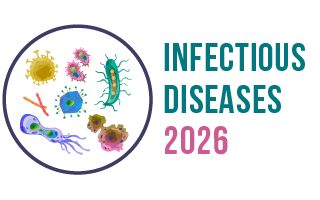4th International Conference on
Infectious Diseases
September 09-10, 2026 | Barcelona, Spain

Address: Avinguda Del Maresme 78 Ronda De Dalt Exit 15, 08940 Comella de Llobregat, Barcelona, Spain
Infectious Diseases 2026

Peking Union Medical Collage, China
Abstract:
Background: Human papillomavirus (HPV) infection is a major global public health issue, with cervical cancer remaining one of the leading causes of cancer-related deaths among women. However, in China, HPV vaccination rates are highly uneven, with rural areas showing considerably lower coverage compared to urban regions. This study aimed to evaluate the effectiveness of momentary interventions, specifically educational videos, in enhancing HPV vaccination willingness among university students, particularly in resource-limited settings.
Methods: A cross-sectional survey was conducted among university students from 23 universities in Beijing, China, to assess their willingness to receive the HPV vaccine. Following the survey, a momentary intervention in the form of a 5-min educational video was implemented to improve knowledge and attitudes about HPV. Data were collected before and after the intervention, focusing on knowledge, attitudes, and willingness to vaccinate. Statistical analyses, including logistic regression and latent change models, were used to assess the impact of the intervention.
Findings: A total of 6,244 valid responses were analysed. The study found considerable improvements in HPV vaccination willingness post-intervention, particularly among respondents who were initially hesitant or unwilling. The educational video intervention notably increased vaccination willingness from 33.41% to 53.37%. Knowledge about HPV also improved considerably, and attitudes towards the vaccine became more positive. Factors such as gender, place of origin, family support, and vaccine accessibility were found to influence willingness to vaccinate, with rural residents and those with higher family support showing stronger intent to vaccinate.
Interpretation: Momentary interventions, such as educational videos, are a cost-effective and efficient approach for promoting HPV vaccination. While the intervention successfully improved knowledge and attitudes, structural barriers, such as vaccine accessibility and affordability, still pose considerable challenges. This study suggests that policymakers enhance resource allocation and address socioeconomic factors to further improve vaccination rates, particularly in underserved areas.
Biography:
Yuxi Liu is a medical professional affiliated with Peking Union Medical College in Beijing, China. With a strong background in medical sciences, Yuxi is dedicated to advancing healthcare through research and clinical practice.
